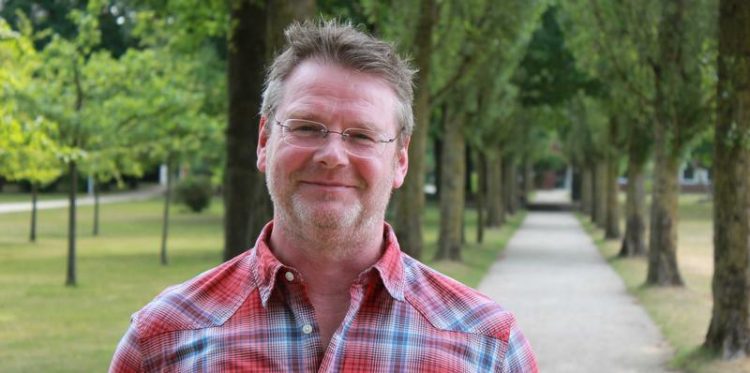Big research on the smallest organisms

Dr. Matthias Ullrich, Professor of Microbiology at Jacobs University Bremen. Jacobs University Bremen
He also faces the reality of life outside – outside the gates of Jacobs University Bremen. Ullrich is not someone who hides in the laboratory. In “Science goes Public”, a format for communicating scientific topics, he advertises his research in pubs.
The 54-year-old is present on the research mile at the Schlachte fair, has organized the lecture series in the Spicarium for a long time and continues this now with “Science for everyone” in the Bürgerhaus Vegesack. He cooperates with schools and is committed to “Jugend forscht”, a German youth science competition. Transferring knowledge in an easy-to-understand way is extremely important to him, he says. “For me it makes no sense at all to work on something if we don't succeed in making the topic public.”
His topic is microorganisms. He has been fascinated by microorganisms since studying biology at the University of Jena, way back when the German Democratic Republic still existed. At that time, he quickly realized that the dissection of rats and mice was not his thing. He came across plant biology and with it microscopically small organisms, fungi, algae, bacteria and viruses. The extreme diversity of unicellular organisms and their ability to adapt and interact inspire him. “There is no other form of life that has so many different varieties.”
This diversity is also reflected in Ullrich's research. The scientist is working on the production of new antibiotics from rhododendrons, the decoding of cocoa bean ingredients and, in marine microbiology, also on the production of antibiotics from algae. The wide range of his tasks is also reflected in a transformation in his specialist field. Microbiology has evolved from a discipline-oriented science to a sought-after problem-solving science that interacts with many other disciplines. “That's what makes it so easy for me to work with others,” he says.
On the campus of Jacobs University, he cooperates with chemists, biochemists, geneticists and cell biologists. He conducts research and teaches together with scientists from the Max Planck Institute for Marine Microbiology, the Alfred Wegener Institute Helmholtz Center for Polar and Marine Research and the Leibniz Center for Marine Tropical Research. “I love interdisciplinary research,” says Ullrich. It was also one of the reasons why he moved from the Max Planck Institute in Marburg to the newly founded International University of Bremen after several years in the United States.
That was in 2002. “I knew right away: this is the perfect place for me. The idea of training highly motivated young people from all over the world is obviously my destiny. I have always believed in this idea and continue to do so,” says Ullrich, who lives not far from Jacobs University in Bremen-North. He is pleased that he was and is able to contribute to the success of this idea. He is also pleased about the results of 16 years of research, which manifest themselves in publications in renowned scientific journals from vastly differing fields: marine microbiology, antibiotics research and cocoa research. “This sometimes leads to confusion,” says Ullrich. “But it is something to be proud of.”
This text is part of the series “Faces of Jacobs”, in which Jacobs University is featuring students, alumni, professors and employees. For more stories, please have a look at https://www.jacobs-university.de/faces
More information can be found at:
http://mullrich.user.jacobs-university.de/?_ga=2.65402414.1872262312.1531732726-…
About Jacobs University Bremen:
Studying in an international community. Obtaining a qualification to work on responsible tasks in a digitized and globalized society. Learning, researching and teaching across academic disciplines and countries. Strengthening people and markets with innovative solutions and advanced training programs. This is what Jacobs University Bremen stands for. Established as a private, English-medium campus university in Germany, it is continuously achieving top results in national and international university rankings. Its almost 1,400 students come from more than 100 countries with around 80% having relocated to Germany for their studies. Jacobs University’s research projects are funded by the German Research Foundation or the European Research Council as well as by globally leading companies.
For more information:
https://www.jacobs-university.de
https://www.facebook.com/jacobs.university
https://www.youtube.com/user/JacobsUni
https://twitter.com/jacobs_bremen
https://www.instagram.com/jacobsuniversity/
https://www.weibo.com/jacobsuniversity
Media Contact
All latest news from the category: Life Sciences and Chemistry
Articles and reports from the Life Sciences and chemistry area deal with applied and basic research into modern biology, chemistry and human medicine.
Valuable information can be found on a range of life sciences fields including bacteriology, biochemistry, bionics, bioinformatics, biophysics, biotechnology, genetics, geobotany, human biology, marine biology, microbiology, molecular biology, cellular biology, zoology, bioinorganic chemistry, microchemistry and environmental chemistry.
Newest articles

Silicon Carbide Innovation Alliance to drive industrial-scale semiconductor work
Known for its ability to withstand extreme environments and high voltages, silicon carbide (SiC) is a semiconducting material made up of silicon and carbon atoms arranged into crystals that is…

New SPECT/CT technique shows impressive biomarker identification
…offers increased access for prostate cancer patients. A novel SPECT/CT acquisition method can accurately detect radiopharmaceutical biodistribution in a convenient manner for prostate cancer patients, opening the door for more…

How 3D printers can give robots a soft touch
Soft skin coverings and touch sensors have emerged as a promising feature for robots that are both safer and more intuitive for human interaction, but they are expensive and difficult…





















